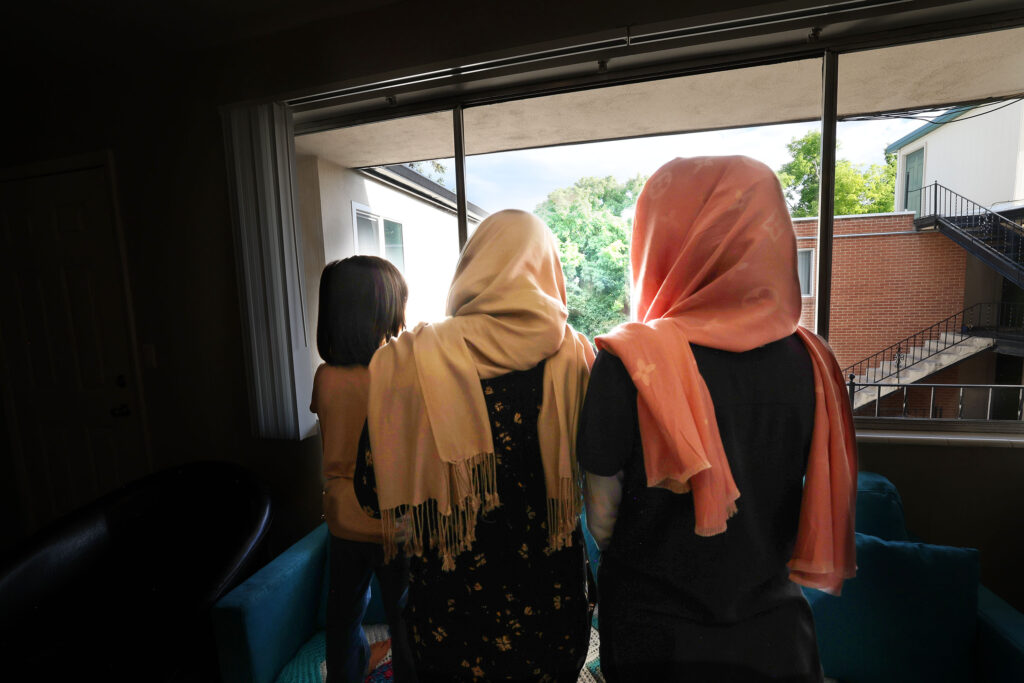
The stranger escorted the three girls into a dark, cold apartment in a country they only knew through television shows.
For 16-year-old Baran, her 31-year-old sister, and their 4-year-old niece, it did not feel like the refuge they imagined as they fought their way through desperate crowds at the airport in Kabul, Afghanistan, in August of 2021.
“The first night that we came to Utah, it was a very horrible situation,” said Baran, who doesn’t use her real name in an effort to protect her family in Afghanistan. “There was no power, no heat and this apartment was dark, completely dark.”
They asked the resettlement agent to come back the next day. Struggling to meet the demands of helping to resettle hundreds of Afghan evacuees in Utah, the caseworker told them he’d return the following week.
Then he left, closing the door on the dark room.
Before escaping Afghanistan, they had never spent a night without their family. In the chaotic crowds at the airport in Kabul, they were separated from their parents who never made it through the gates. They never even got a chance to say goodbye. That night, they huddled under donated blankets in a strange land without a friend.
“If we live here with this kind of situation, I want to come back to Afghanistan,” Baran’s sister told her. They were alone, scared, and so she wondered if it might be better to risk living with the Taliban. At least their family would be together.
It was not the kind of warm welcome that Utah Gov. Spencer Cox probably envisioned when he wrote to President Joe Biden offering Utah as a safe haven for Afghans.
“I’m proud of our state’s heritage, which has shaped our willingness to embrace those in need,” he wrote in an editorial, referring to ancestors from The Church of Jesus Christ of Latter-day Saints who came to Utah because of religious persecution. “Within minutes of my writing to the president, letters, calls and notes from mayors, business leaders and fellow Utahns from all walks of life began flooding in, expressing support and offering to help.”
It wasn’t just Utah. Across the country, there was widespread support for Afghan evacuees. In a poll shortly after the evacuation, seven out of 10 Americans said they supported resettling Afghans who worked with the U.S. government or military.
America promised to be a welcoming nation for our Afghan allies, but how well did we deliver on that promise? Over the course of a two-year investigation, the Stranger Becomes Neighbor podcast follows the experience of Afghan arrivals and the people who try to help them. What happens for Baran and thousands of others like her depends in part on their neighbors.
But what can one person do in the face of an international disaster decades in the making?
‘This is a big challenge’
About 80,000 Afghans arrived in a very short time frame — the biggest war-time influx the U.S. had seen since the fall of Saigon. And they came during a pandemic, a severe shortage of affordable housing and at a time when the resettlement agencies had been reduced to almost nothing. By the end of President Donald Trump’s term, refugee admissions were slashed to 15,000, from 85,000 in the last year of the previous administration. With the reduced number of refugees coming to the U.S., resettlement organizations were decimated, staff laid off and offices closed.
“The whole program, basically, was shut down,” said Aden Batar of Catholic Community Services. “The infrastructure of the program was destroyed, pretty much.”
The two main resettlement agencies in Utah — Catholic Community Services and International Rescue Committee — were left with a handful of staff to handle hundreds of expected arrivals. Agencies across the country were just starting to rebuild when Kabul fell, and Afghans started arriving in our communities.
“This is a big challenge,” Batar said. “When the families are arriving they need a lot of support. These folks need friends in order for them to be successfully integrated into our community.”
Given the challenging situation, case workers could not spend as much time as they normally would have with people like 16-year-old Baran and her family. So the experience of the new arrivals often depended on volunteers and neighbors to fill in the gaps.
It’s been two years since the harrowing U.S. evacuation from Afghanistan, and there are stories like Baran’s playing out across the country, maybe in your neighborhood. In the house next door or the apartment downstairs, people could be trying to rebuild their lives. Many remain without family members, without jobs, and without the certainty of what their future in this country will be.
Who will help Baran and her family? We’ll find out in the next episode of Stranger Becomes Neighbor.